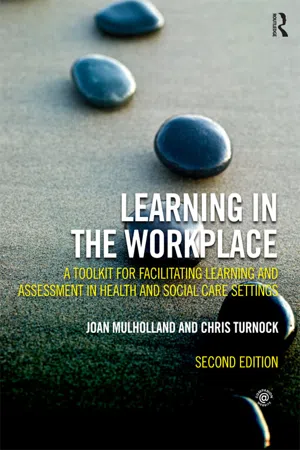
Learning in the Workplace
A Toolkit for Facilitating Learning and Assessment in Health and Social Care Settings
- 160 pages
- English
- ePUB (mobile friendly)
- Available on iOS & Android
Learning in the Workplace
A Toolkit for Facilitating Learning and Assessment in Health and Social Care Settings
About this book
This toolkit is designed for preparing health and social care practitioners for their role in facilitating learning in their workplace. It enables readers to recognise learning opportunities, communicate their professional knowledge, provide students with appropriate support, judge performance, co-ordinate student contact with others in the workplace and develop awareness of the needs of students from diverse backgrounds. With plenty of activities and questions, the reader can assess their knowledge base and apply the concepts in the toolkit to their work setting.
This new edition is fully updated and now includes: international contexualisation; more coverage on meeting the diverse needs of students; and a new section on meeting professional standards, which discusses the NMC standards as well as those of other disciplines. A new companion website makes valuable supplementary material available – including further activities and articles on managing the placement learning experience, developing new supervisors, and making the most of reflection among others.
Practical and easy-to-read, this is an important resource for all those practitioners who support students in the workplace.
Frequently asked questions
- Essential is ideal for learners and professionals who enjoy exploring a wide range of subjects. Access the Essential Library with 800,000+ trusted titles and best-sellers across business, personal growth, and the humanities. Includes unlimited reading time and Standard Read Aloud voice.
- Complete: Perfect for advanced learners and researchers needing full, unrestricted access. Unlock 1.4M+ books across hundreds of subjects, including academic and specialized titles. The Complete Plan also includes advanced features like Premium Read Aloud and Research Assistant.
Please note we cannot support devices running on iOS 13 and Android 7 or earlier. Learn more about using the app.
Information
1 | discuss the different ways that people learn |
2 | evaluate the range of methods used to aid learning in the workplace |
3 | develop the skills essential to successfully teach in the workplace |
4 | design, plan, implement and evaluate a learning programme in the workplace. |
• | Which of the theories helps you learn most? |
• | Which theory do you learn least from? |
1 | Adults need to be involved in the planning and evaluation of their instruction. |
2 | Experience (including mistakes) provides the basis for learning activities. |
3 | Adults are most interested in learning subjects that have immediate relevance to their job or personal life. |
4 | Adult learning is problem-centred rather than content-oriented. |
Table of contents
- Cover Page
- Title Page
- Copyright Page
- Contents
- List of figures
- List of tables
- Acknowledgements
- Introduction
- 1 Learning and teaching in the workplace
- 2 Supporting learning in the workplace
- 3 Reflection on and in the workplace
- 4 Assessment in the workplace
- 5 Working with others in the workplace
- 6 Diversity in the workplace
- 7 Portfolio completion guidelines
- Index